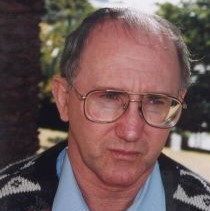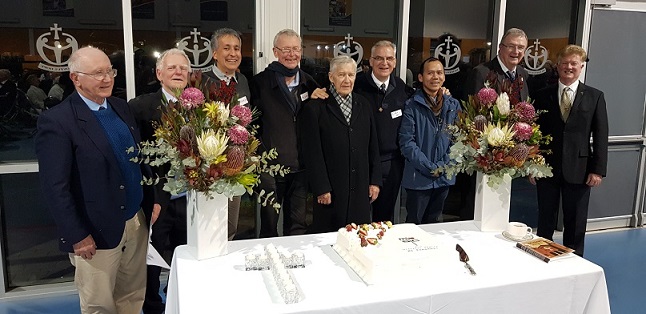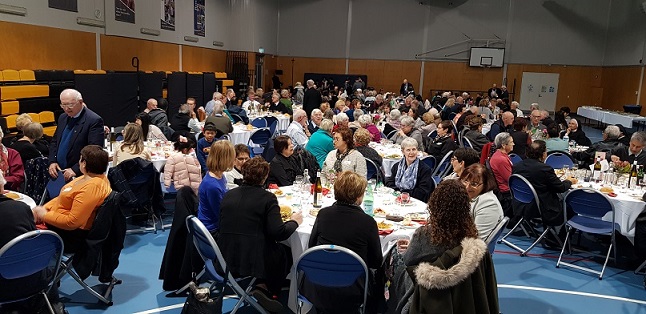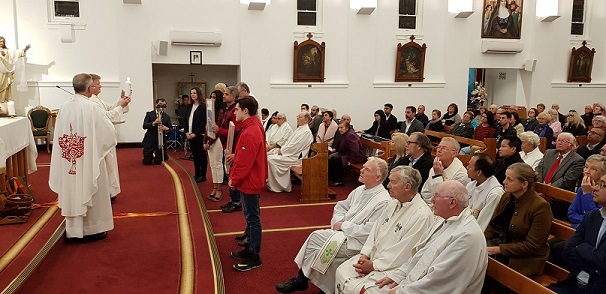Meet Fr Bill Brady msc

Today’s MSC Update reminded us that 4th October is Bill Brady’s 75th birthday. On December 13th, he will be 45 years ordained. He has just experienced some surgery and is recovering.
This article first appeared earlier this year in the OLSH Randwick Parish Bulletin – Bill is now stationed in Randwick. The other photos are from the celebrations when the MSC withdrew from Hindmarsh parish, Adelaide. Bill was the last parish priest.
“Fr Bill Brady has served 8 parishes and 3 schools in his 44 years of priesthood. In mid 2019, he was appointed to our parish.
Fr Brady tells an interesting story about how he joined the Missionaries of the Sacred Heart. ’It was 1969. I had been thinking of become a priest - a missionary one - when I read an article in the Catholic Weekly about the MSCs. I had not heard of them, so I replied to the advertisement and by late that year, at age 24 I had started my pre- novitiate training at the Late Vocation Centre at the Kensington Monastery'.
He had left school, Woodlawn College Lismore, in 1962 and started work at the Rural Bank of NSW (coincidentally the present Provincial, Fr Chris McPhee also worked in a bank pre-ordination). His name was in the ballot for National Service in 1966 and he spent the next two years in the Army during which time he spent 6 months in Malaysia (MaIacca).There never was any real thought of priesthood at this time.

Bill Brady, end left. MSC in Adelaide 2019
‘I was ordained on 13 December 1975 and said my first Mass at St Patrick’s Smithtown, a small town on the North Coast near Kempsey. This was the parish I grew up in. My first appointment was to St Peter Chanel College Ulapia, New Britain in Papua New Guinea. Those first three years of Priesthood were probably the most difficult. The climate, the disease-carrying mosquitoes, the cultural differences, the expectations and lack of resources, but worst of all I contracted an illness that bedeviled me for 8 years’.
As part of recuperation he spent 3 months at OLSH Randwick in 1978. ‘I liked it then, and that hasn’t changed’. For the next few years he held appointments at a number of MSC Colleges (Bowral, DownIands, and St Johns Darwin) found time to complete a University degree and in 1995 was appointed Parish Priest at St Paul’s Nightcliffe, Darwin. Apart from being an assistant priest at Kippax in ACT in 1982 this was his first real experience of Parish life.
Parts of the parish were in a fairly low socio-economic area and there was petty crime around and about. The parishioners were laid back but open to change.
Example? ’Moving the altar was a big ask of these parishioners but by consulting them, offering them some options meant that the decision was theirs as much as mine. It taught me that involving the laity will make changes in today’s church possible’ he added. ‘(I notice in the latest MSC Bulletin the altar is now back in the more traditional position)’.
Most of us can remember where we were on 9/11, the Twin Towers attack in New York. Fr Bill had been on a sabbatical, had visited Issoudon in France where the MSCs were founded and he was in the main street of Dublin when he watched it on TV. The return trip home met with some discomfort at Heathrow as the Americans now unable to return for security reasons occupied all the seats, catching up on sleep. He had to stand for seven hours at the airport waiting to board the plane to bring him home.

Quite a number of appointments followed, notably Henley Beach, Adelaide, four others while on loan to Townsville Diocese over a 5 year period and in 2010 he was appointed Parish Priest of Hindmarsh. Here he experienced both wonderful and sad times. It had been an MSC parish for 105 years, cared for 5 Catholic schools in the area and was one of two South Australian MSC parishes. But with no MSC priests available the parish became a diocesan one. Sadly the number of active MSC priests is declining. And replacements are not forthcoming. At one stage there were none joining the Order for six years although there’s a trickle now in training.
‘I was reminded’, he said, ‘as he bid Hindmarsh farewell of the Book of Ecclesiastes, ‘A time for everything under heaven’ and so it was a time to say goodbye. It was a parish strong on community much like the community we have here at OLSH.’
But he remains hopeful. Vatican 11 for him was the lightning rod for change. Religious life became different and better. The change from the monastic life to a more open engagement with the laity was very significant. Latin was replaced by English especially for Scripture Readings at Masses and priests facing the congregation were also significant changes.
He welcomes many of the liturgical changes but is not a big fan of the new liturgy. Something went wrong, the language in parts is stilted and some words are foreign to all of us in their meaning (consubstantial comes to mind).
He is strongly supportive of increasing the role of the laity, not an easy ask involving some loosening of the role of church leaders and the need for more consulting with the laity. ‘We’re all equal because of our Baptism’ he says ‘it’s just there are differing roles for clergy and laity. The world is changing and some of our practices need changing too’.

Difficult he says but he is hopeful that meaningful changes will take place. He has great admiration for Pope Francis as he strives to modernise the church especially in the area of social justice.
Regrets? ‘I’d like better health but being a priest has given me much joy and I hope that I have helped those many good people I have met along the way’.